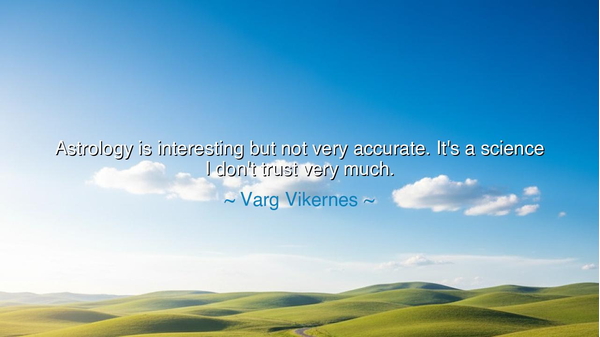
Astrology is interesting but not very accurate. It's a science I
Astrology is interesting but not very accurate. It's a science I don't trust very much.






Hear the words of Varg Vikernes, spoken with bluntness and severity: “Astrology is interesting but not very accurate. It’s a science I don’t trust very much.” These words pierce like an arrow through the mists of superstition, for they remind us that fascination is not the same as truth, and curiosity must not be mistaken for certainty. To the seeker of wisdom, this is both a warning and an invitation: to admire the poetry of the stars, yet to walk carefully when men claim the heavens dictate our fates.
The meaning is this: astrology, ancient and captivating, has long stirred the imagination of humanity. The stars have been read as maps, as omens, as guides to destiny. They have inspired kings and poets alike. Yet fascination does not make them accurate. To believe too strongly in these charts and signs is to risk chaining one’s life to illusions. Vikernes admits their allure, but he refuses to place his trust in them, for trust must be given only to that which endures scrutiny, not to fleeting predictions wrapped in mystery.
The origin of such skepticism lies in the clash between myth and science. For centuries, the movement of planets was thought to dictate the rise of empires, the fate of battles, even the temperament of a newborn child. Yet as astronomy grew, as telescopes unveiled the truth of the cosmos, mankind saw that stars are suns, distant and burning, not divine messengers whispering of our daily affairs. The science of the heavens belongs not to the astrologer but to the astronomer, and in this recognition lies Vikernes’s rejection of astrology’s claim to authority.
History offers many lessons here. Think of the mighty Emperor Augustus, who rose with omens of a star said to announce his reign. Rome trusted the heavens, and poets wrote of divine sanction. Yet the empire fell not by stars, but by men, by ambition, corruption, and division. Or recall Christopher Columbus, who once used an eclipse to terrify the native people, claiming the heavens would prove his power. He deceived them not with truth, but with the manipulation of superstition. In both tales, the stars were wielded, but their power came not from accuracy, but from belief.
And yet, one must not despise astrology entirely, for it has value as metaphor, as poetry of the human soul. The constellations speak in symbols, and symbols can stir reflection. But to treat them as science, to bind one’s decisions to their shifting words, is folly. Vikernes’s words, stern and unsentimental, remind us to discern between what inspires and what governs, between what delights the imagination and what deserves the weight of trust.
The danger lies in surrendering judgment. When men and women lean too heavily on horoscopes and prophecies, they may neglect their own reason, their own choices, their own accountability. To believe one’s destiny lies only in the turning of planets is to deny the nobility of free will. It is easier to blame the stars than to wrestle with one’s own responsibility. Yet wisdom demands courage: to stand upright, to make choices, and to accept their consequences, rather than to hide behind the veil of the heavens.
The lesson, then, is this: let the stars inspire you, but do not let them bind you. Seek beauty in their patterns, but seek truth in the light of knowledge and the fire of reason. Trust not in vague predictions, but in the clarity of disciplined thought and the power of your own will. For destiny is not written in the skies but carved in the choices of men and women who dare to live authentically.
Take this as a guiding flame: “Astrology is interesting, but not worthy of much trust.” Hold wonder in one hand and discernment in the other. Do not surrender your life to charts and signs. Instead, walk boldly beneath the stars, not as their prisoner, but as their admirer—free, unbound, and master of your own path.






AAdministratorAdministrator
Welcome, honored guests. Please leave a comment, we will respond soon